Artigas Brugal: "The future lies in intelligent, sustainable and digital growth"

The Secretary of State for Digitalisation and Artificial Intelligence, Carme Artigas, was in charge of opening the Forum of the Association of Companies Contracting with Public Administrations (AESMIDE), which, in its 14th edition, brought together experts from the Administration, politics and business to reflect on "Economic recovery" at the Spanish Mint. The event was hosted by the journalist Roberto Arce.
Artigas' first words were to praise the work of AESMIDE in promoting the public-private relationship. He then highlighted the decisive moment we are living in for digital transformation, as well as the Government's commitment "to work for a modern, inclusive and global Spain". The future, he added, "depends on smart, sustainable and digital growth" and on a productive model and a digital and competitive economy.
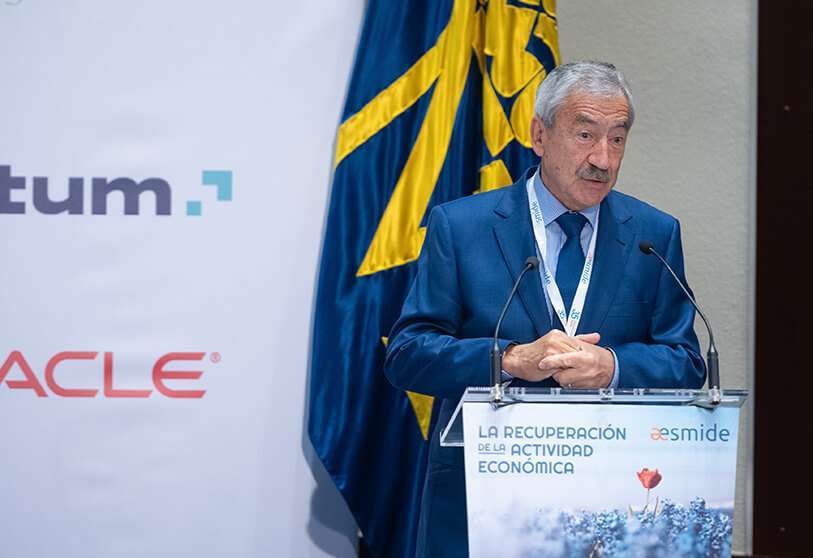
Before the words of the Secretary of State for Digitalisation and Artificial Intelligence, the President of AESMIDE, Gerardo Sánchez Revenga, stressed that Spain needs to consider what tools are necessary for economic recovery, hence the organisation of this meeting in which the advances in digital transformation, the economic and financial measures implemented, the Next Generation funds and recruitment in the face of the rigidity of the Administration have been addressed. Another objective of this Forum, as he indicated, is to make the Administration aware of the capabilities of companies to solve their needs, "the DNA of the association is the collaboration between the administration and the company".
For Sánchez Revenga, preserving the business fabric, increasing investments and funds or facilitating the processing of contracts are some of the measures that must be taken to reactivate the country's economy. In addition to digitalisation, the establishment of clear planning and control of public funds, "there is capacity for recovery because companies in Spain are very flexible", he said before the closing speech by the Secretary of State for Defence, Esperanza Casteleiro, who described the European funds as a "great opportunity".
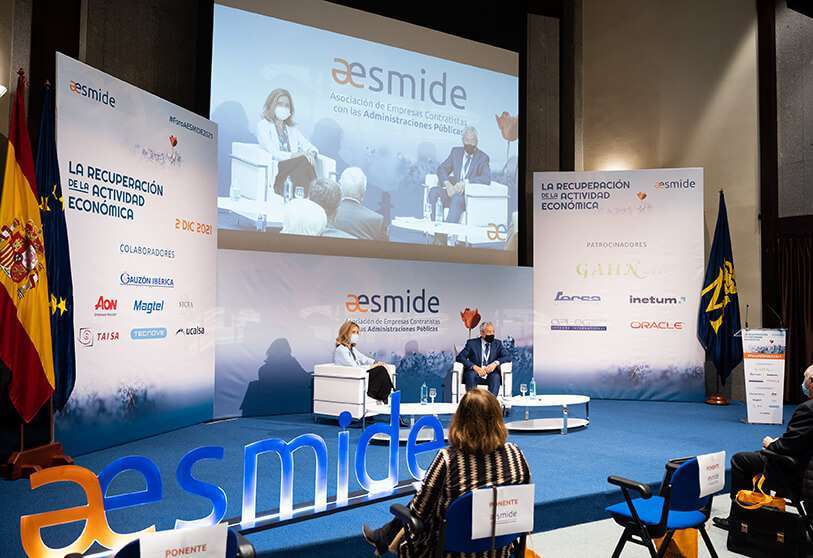
Isabel Valdecabres, director of the Fábrica Nacional de la Moneda y timbre FNMT, welcomed the president of AESMIDE and explained the role of this entity as a lever for digital transformation in Spain. Valdecabres stated that the digitisation of the public administration is decisive as a driver of change, a challenge, she said, from which it starts in a good position and which has demonstrated its solidity and solvency during the pandemic.
Valdecabres indicated that in the digital transformation the citizen, both individual and company, must be at the centre, and that the FNMT will provide its service not only as a means of the General State Administration but also for local and regional administrations.
Finally, she alluded to the need for collaboration with private companies, and the lack of agility and security that the FNMT provides as a public certification body.
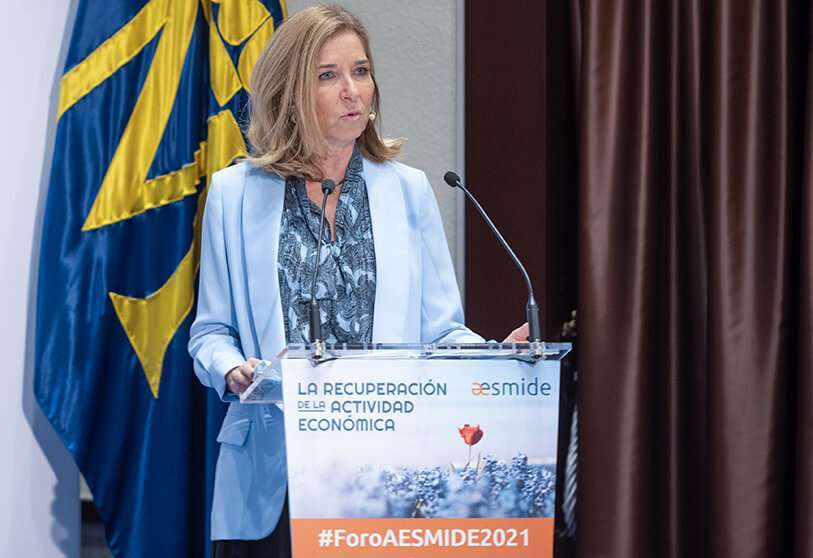
To analyse Spain's role in the European fiscal framework, Cristina Herrero Sánchez, President of the Independent Authority for Fiscal Responsibility (AIREF), highlighted the existing uncertainty and defended the need to guarantee the sustainability of public accounts and to plan for the coming years.
Herrero recalled that in 2020 Spain recorded the biggest fall in GDP and debt in Europe, and although in 2021, he said, a path of economic growth can be seen, it is "slower than expected". She indicated that we have two challenges at the economic and budgetary level and that it is necessary to make them compatible and that the administrations should not include more uncertainty. "The Next Generation Funds are the biggest stimulus package," she said.
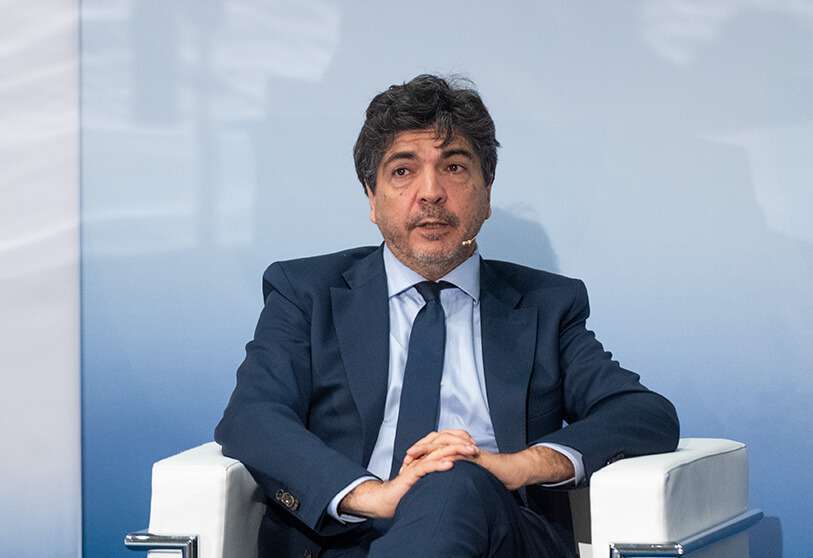
The Forum continued with Roberto Arce's interview with PP MP Mario Garcés, who stressed that Spain's situation, in comparative terms, is not good and that we are at the tail end of the recovery of wealth. For the member of the PP, the concept of compensation and public aid has been mistaken, and he said that these have been carried out "with little operability", since 50% of the funds that have been transferred to the Autonomous Regions have not been able to be managed due to the rigidities imposed.
Garcés also spoke of the tourism sector "which needs immediate incentives"; of the 2012 labour reform: "United Podemos and the PSOE know perfectly well that it cannot be completely repealed because there is an upper limit, which is the European Commission"; that it is "time to think about the country project, not the regional one"; and of the need to "selectively lower taxes".

A round table discussion on "The keys to transformation" brought the meeting to a close. Jesús Manuel Gómez, Undersecretary of Transport, Mobility and Urban Agenda, highlighted the investment effort of more than 40,000 million euros, of which 16,300 million will be managed by the Ministry, of which 7,000 million will be for railway infrastructures (suburban and freight); 2,500 million for roads, mainly for maintenance; and more than 3,000 million for urban matters. Jorge Fabra, Deputy Director General for Programming of the National Recovery Plan, spoke of the transformation of the economy through four axes: green, digital, social and gender equality, and stressed that the European funds, which represent the largest public investment undertaken in our country, "are going to bring about a structural change in the Spanish economy". Juan Antonio Martínez, the Financial Controller Delegate at the Anti-Corruption Prosecutor's Office, spoke of the complexity of contract legislation and the need to increase specialised staff, create new units and define clear interlocutors for the processing of files. Finally, Julio Rilo, Director of Technology at INIXA DEL PRINCIPADO, warned of the seriousness of disinformation and false news, as well as the great economic impact they represent, "it is a very serious problem", he said.
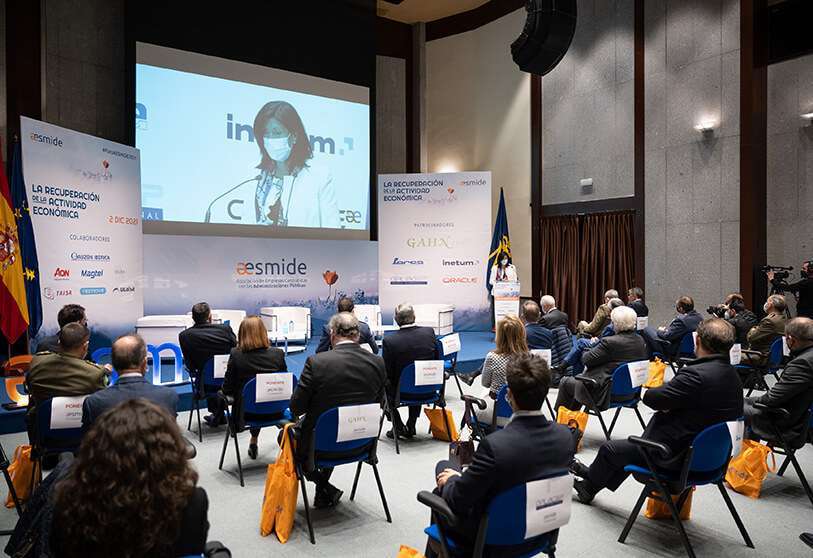
The Secretary of State for Defence, Esperanza Casteleiro, closed the AESMIDE-2021 Forum by assuring that the funds approved for the Ministry of Defence are focused on economic recovery and "promote the change of production model and move towards a structural modernisation of the nation". She also recalled that, in 2020, the defence industry had a turnover of 6.7 billion euros and the total economic activity linked to its companies contributed 8.5 billion, 0.8% of the national GDP. She also highlighted that 75% of the turnover of the Spanish defence industry is exports, ranking 7th in the world, and that it generates 23,000 direct jobs. These figures, he said, indicate the impact of this sector on national economic recovery.










